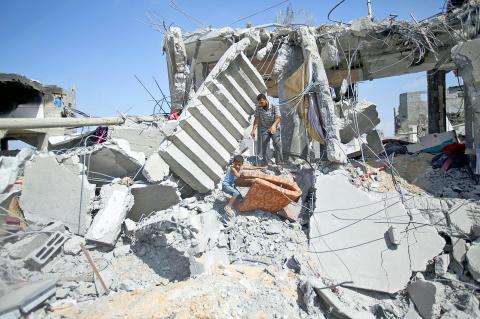Israel and Hamas began indirect talks on a new border deal for the blockaded Gaza Strip as a ceasefire ending their month-long war entered its second day yesterday.
Israel has said it wants the militant group to disarm, or at least ensure it cannot rearm, before considering Hamas’ demand that the territory’s borders be opened. Israel and Egypt imposed a closure after the Hamas takeover of Gaza in 2007.
The indirect talks are being held in Cairo, with Egyptian mediators shuttling between the delegations.

Photo: AFP
Disarming Hamas tops the list of Israeli demands presented in a meeting with Egyptian mediators late on Tuesday, said an Egyptian security official, who spoke on condition of anonymity because he was not authorized to speak to the media.
The Israeli delegation has since left for Israel, but was to return to Cairo later yesterday, the official added.
The Palestinian delegation is composed of negotiators from all major factions, including Hamas, and was to meet with Egyptian officials later yesterday to be briefed on Israel’s demands, Palestinian delegate Bassam Salhi said.
“The most important thing to us is removing the blockade and start reconstructing Gaza,” Salhi said. “There can be no deal without that.”
He said the ceasefire, set to expire at 8am tomorrow, would likely be extended if more time for talks is needed.
Talks are still in the early stages, but the outlines of a possible solution have emerged, including internationally funded reconstruction of Gaza overseen by a Palestinian unity government led by Palestinian President Mahmoud Abbas. The Western-backed Abbas lost control of Gaza in the Hamas takeover of 2007.
In a step toward reconstruction, Norway is organizing a donor conference, tentatively set for the beginning of next month.
Regarding easing the blockade, a statement by Egyptian intelligence indicated it would not agree to major changes at the Rafah crossing between Egypt and Gaza, and the onus of lifting the border closure would fall on Israel.
The ceasefire is the longest lull in a war that has killed nearly 1,900 Palestinians.
The war broke out on July 8, when the Israeli military began bombarding targets in Gaza in an attempt to stop Hamas from launching rockets at Israel and then nine days later it sent in ground troops to destroy underground tunnels.
In the weeks leading up to the war, Israeli-Palestinian tensions had already been rising following the June killings of three Israeli teenagers, whose bodies were discovered two weeks after they disappeared in the West Bank.
Israel accused Hamas of being behind the abductions and subsequently carried out a massive ground operation in the West Bank, arresting hundreds of Hamas operatives as part of a manhunt.
Then early last month, an Arab teenager was abducted and burned alive by Israeli extremists in an apparent revenge attack.
Six Jewish Israelis were arrested for that killing.
The Israeli Ministry of Justice on Tuesday said it had arrested Hussam al-Qawasmi, the suspected mastermind behind the killing of the Israeli teens.

The US government has signed defense cooperation agreements with Japan and the Philippines to boost the deterrence capabilities of countries in the first island chain, a report by the National Security Bureau (NSB) showed. The main countries on the first island chain include the two nations and Taiwan. The bureau is to present the report at a meeting of the legislature’s Foreign Affairs and National Defense Committee tomorrow. The US military has deployed Typhon missile systems to Japan’s Yamaguchi Prefecture and Zambales province in the Philippines during their joint military exercises. It has also installed NMESIS anti-ship systems in Japan’s Okinawa

‘WIN-WIN’: The Philippines, and central and eastern European countries are important potential drone cooperation partners, Minister of Foreign Affairs Lin Chia-lung said Minister of Foreign Affairs Lin Chia-lung (林佳龍) in an interview published yesterday confirmed that there are joint ventures between Taiwan and Poland in the drone industry. Lin made the remark in an exclusive interview with the Chinese-language Liberty Times (the Taipei Times’ sister paper). The government-backed Taiwan Excellence Drone International Business Opportunities Alliance and the Polish Chamber of Unmanned Systems on Wednesday last week signed a memorandum of understanding in Poland to develop a “non-China” supply chain for drones and work together on key technologies. Asked if Taiwan prioritized Poland among central and eastern European countries in drone collaboration, Lin

BACK TO WORK? Prosecutors said they are considering filing an appeal, while the Hsinchu City Government said it has applied for Ann Kao’s reinstatement as mayor The High Court yesterday found suspended Hsinchu mayor Ann Kao (高虹安) not guilty of embezzling assistant fees, reducing her sentence to six months in prison commutable to a fine from seven years and four months. The verdict acquitted Kao of the corruption charge, but found her guilty of causing a public official to commit document forgery. The High Prosecutors’ Office said it is reviewing the ruling and considering whether to file an appeal. The Taipei District Court in July last year sentenced Kao to seven years and four months in prison, along with a four-year deprivation of civil rights, for contravening the Anti-Corruption

NO CONFIDENCE MOTION? The premier said that being toppled by the legislature for defending the Constitution would be a democratic badge of honor for him Premier Cho Jung-tai (卓榮泰) yesterday announced that the Cabinet would not countersign the amendments to the local revenue-sharing law passed by the Legislative Yuan last month. Cho said the decision not to countersign the amendments to the Act Governing the Allocation of Government Revenues and Expenditures (財政收支劃分法) was made in accordance with the Constitution. “The decision aims to safeguard our Constitution,” he said. The Constitution stipulates the president shall, in accordance with law, promulgate laws and issue mandates with the countersignature of the head of the Executive Yuan, or with the countersignatures of both the head of the Executive Yuan and ministers or